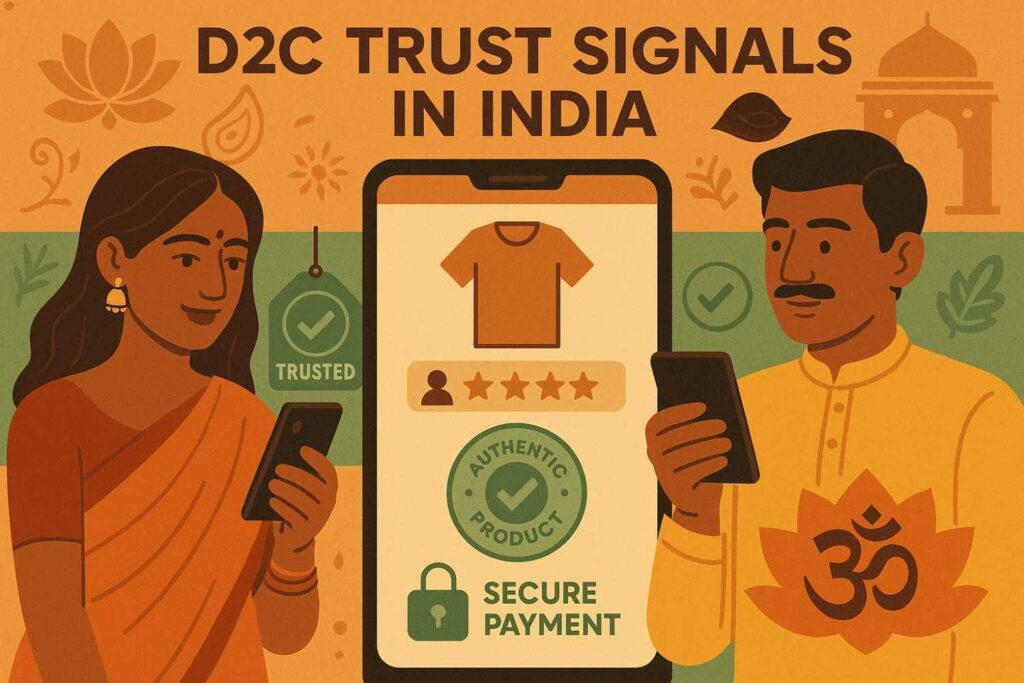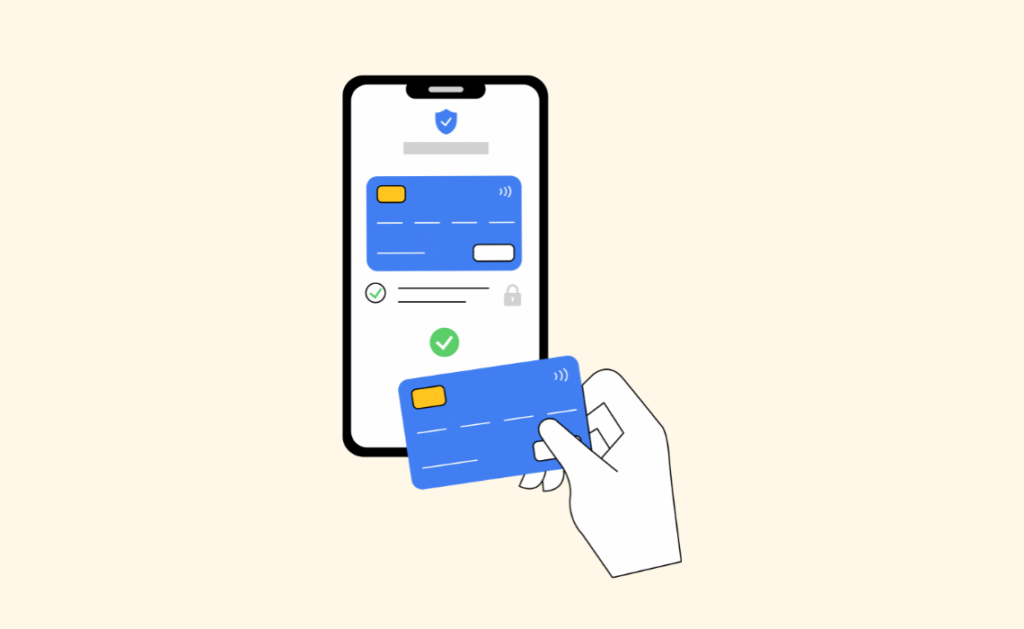Table Of Content
- When Trust Becomes Your Biggest Business Challenge
- Understanding D2C Trust Signals India: The Cultural Context
- The 7 Essential D2C Trust Signals India: Strategies That Actually Convert
- Trust Signal #1: Social Proof That Resonates with Indian Hearts
- Trust Signal #2: Transparent Pricing That Respects Indian Value Consciousness
- Trust Signal #3: Local Payment Integration That Feels Like Home
- Trust Signal #4: Authentic Customer Service Excellence
- Trust Signal #5: Return Policies That Remove Purchase Anxiety
- Trust Signal #6: Local Community Connection Beyond Digital
- Trust Signal #7: Quality Assurance and Authenticity Guarantees
- Building D2C Trust Signals India: Your Implementation Roadmap
- Your D2C Trust Signals India Journey Starts Now
- Frequently Asked Questions
- Q: How long did it take ClassyStreet to build significant trust in the market?
- Q: What’s the minimum budget needed to implement these trust signals effectively?
- Q: Which trust signal gave ClassyStreet the highest ROI?
- Q: How do you handle negative reviews and feedback constructively?
- Q: What mistakes did you make in your first 2 years that other founders should avoid?
- Q: How do you measure trust-building success beyond sales metrics?
- Q: Should bootstrapped startups focus on all seven trust signals from day one?
- Q: How do regional variations across India affect trust signal implementation?
When Trust Becomes Your Biggest Business Challenge
Picture this: It’s 2013, and I’m sitting in a small handloom weaver’s workshop in Sambalpur, Odisha. The master weaver looks at me skeptically as I explain how customers will buy his exquisite Sambalpuri sarees online without touching the fabric. His weathered hands gesture dismissively, “Saheb, log kapda chhuke bina kaise kharidenge?” (Sir, how will people buy fabric without touching it?)
That moment defined my next 11 years as the founder of ClassyStreet, India’s first handloom e-commerce platform. Building trust in D2C sales in Bharat isn’t just about having a good product – it’s about fundamentally changing how people perceive digital commerce in a country where trust has been built through generations of face-to-face interactions.
After 11 years of navigating the complex landscape of D2C trust signals India, working with thousands of artisans, serving lakhs of customers, and now mentoring entrepreneurs through my role with NITI Aayog, I’ve identified seven critical strategies that can make or break your direct-to-consumer business. These aren’t theoretical frameworks – they’re battle-tested D2C trust signals India that helped ClassyStreet survive and thrive when 70% of D2C brands fail within their first three years.
If you’re a wannabe entrepreneur or early-stage founder struggling to build credibility for your brand, this article contains the hard-earned D2C trust signals India insights that took me years to learn. Understanding effective D2C trust signals India can transform skeptical browsers into loyal customers across diverse regional markets.
Understanding D2C Trust Signals India: The Cultural Context

Before diving into the seven trust signals, let’s address the elephant in the room. Trust in Indian commerce has historically been built through relationships, community endorsements, and physical verification. When we moved this equation online, we didn’t just change the medium – we challenged centuries of ingrained behavior.
During my early ClassyStreet days, I learned that Indian consumers approach online purchases with three fundamental questions: “Is this real?”, “Will I get what I see?”, and “What if something goes wrong?” These questions become even more critical when you’re dealing with regional markets across Bharat, where digital literacy varies dramatically and cultural nuances shape every purchasing decision.
The trust deficit isn’t just about fraud concerns – it’s about emotional comfort. Effective D2C trust signals India must address regional variations where digital literacy varies dramatically and cultural nuances shape every purchasing decision. According to FICCI-EY Digital Commerce Report 2024, implementing culturally relevant D2C trust signals India can increase conversion rates by up to 340% in regional markets.
Through my NITI Aayog interactions with policy makers and grassroots entrepreneurs, I’ve observed that successful brands don’t just build trust – they build culturally relevant D2C trust signals India that resonate with local values. Research from BCG-Google Digital Consumer Study shows that D2C trust signals India implementations vary significantly across regions, with southern states preferring different trust indicators compared to northern markets.
The 7 Essential D2C Trust Signals India: Strategies That Actually Convert
Trust Signal #1: Social Proof That Resonates with Indian Hearts

Generic five-star ratings don’t build trust in Bharat – stories do. During ClassyStreet’s early years, I made the mistake of copying Western review systems. The breakthrough came when we started collecting video testimonials in regional languages from real customers wearing our handloom sarees at their daughter’s weddings or important festivals.
The ClassyStreet Learning: Our conversion rates jumped 340% when we showcased Mrs. Lakshmi from Bangalore speaking in Kannada about how our Mysore silk saree made her feel special at her son’s engagement. That one testimonial generated more trust than 500 generic text reviews.
What Works in Bharat:
- Video testimonials in local languages showing real usage contexts
- Customer stories tied to Indian festivals, weddings, and celebrations
- Regional influencer partnerships (not just metro celebrities)
- Community-driven reviews where customers share their experience in local WhatsApp groups
Implementation Reality: Start with 10-15 authentic video testimonials. These D2C trust signals India took us six months to collect quality regional testimonials, but the trust dividend lasted years. For more insights on customer testimonial strategies, Budget around ₹30,000-50,000 for professional video testimonial collection if you’re serious about building effective D2C trust signals India.
Founder Insight: Never incentivize fake reviews. Indian customers can spot inauthentic social proof from miles away. I learned this the hard way when our rating manipulation attempt backfired spectacularly in 2015.
Discover how over 500 million digital shoppers are transforming the FMCG and retail landscape forever. This comprehensive analysis covers key market trends, consumer behaviors, and the future outlook of India’s booming e-commerce sector.
Read more
Trust Signal #2: Transparent Pricing That Respects Indian Value Consciousness

Indians are value-conscious, not price-conscious. There’s a difference. During my 11-year journey, I’ve seen customers pay premium prices when they understand the complete value proposition, but abandon carts instantly when they encounter hidden charges.
The ClassyStreet Approach: We implemented “Total Price Upfront” strategy where customers see the final amount (including GST, delivery charges, and any additional fees) before adding items to cart. This transparency increased our conversion rates by 67% and reduced cart abandonment by 45%.
Building Price Trust:
- Display all-inclusive pricing prominently
- Show GST breakdowns clearly (Indians appreciate tax transparency)
- Offer regional pricing strategies for Tier-2/Tier-3 markets
- Provide payment plan options for higher-value products
- Never surprise with additional charges at checkout
Real Numbers from Experience: Hidden delivery charges at checkout reduced our conversion by 23%. When we moved to free delivery above ₹999 with clear communication, sales volume increased by 156% despite higher product pricing.
Implementation Budget: Transparent pricing as one of the core D2C trust signals India costs nothing but requires honest profit margin evaluation. If your unit economics don’t support transparency, fix your business model before implementing other D2C trust signals India.
Trust Signal #3: Local Payment Integration That Feels Like Home

Payment integration represents one of the most critical D2C trust signals India because it directly addresses security concerns and familiarity preferences. The game-changer for ClassyStreet wasn’t accepting credit cards – it was embracing UPI and regional payment preferences with the same enthusiasm we showed for international payment gateways.
The UPI Revolution Impact: When we integrated UPI in 2017, our Tier-2 and Tier-3 sales increased by 230%. Customers loved the familiarity and instant confirmation. But the real trust-builder was showing multiple payment options without pushing any particular method.
Payment Trust Builders:
- Prominent UPI integration with multiple apps (PhonePe, Paytm, GPay)
- Cash on Delivery for trust-building (even if you absorb some costs)
- Regional wallet preferences (Airtel Money in certain regions)
- EMI options through familiar platforms
- Clear security badges and SSL certificates
Security Communication Strategy: Instead of technical jargon, we started using simple Hindi/regional language explanations: “Aapka paisa bilkul surakshit hai” (Your money is completely safe) with visual security indicators.
Founder Reality Check: COD increased our operational costs by 12%, but the trust it built in new customer segments generated 45% more lifetime value. Sometimes, trust-building requires short-term profit sacrifices for long-term gains.
Best Payment Gateways in India 2025
Discover fee hacks, compliance secrets, and smart payment tactics tailored for Tier 2 and 3 businesses—insights from an 11-year founder’s experience.
Read more
Trust Signal #4: Authentic Customer Service Excellence

Customer service excellence stands among the most powerful D2C trust signals India because it builds lasting relationships beyond transactions. The Western model of efficient, transactional support doesn’t resonate with Indian customers who value personal connection and cultural understanding.
ClassyStreet’s Customer Service Evolution: Our biggest learning came when a customer from rural Karnataka called about a delayed saree for her daughter’s engagement. Instead of giving her a tracking number, our team member spent 20 minutes understanding the urgency, personally coordinated with logistics, and ensured delivery two days before the ceremony. That customer has bought 47 sarees from us over 8 years and referred 23 new customers.
Building Service Trust:
- Regional language support (not just Hindi and English)
- Cultural sensitivity training for support teams
- Personal relationship building, not transactional interactions
- WhatsApp support integration (Indians prefer WhatsApp over email)
- Response time expectations aligned with Indian communication patterns
The Relationship Investment: We measure customer service success not just by resolution time but by repeat purchase rates and referral generation. Our support team has personal relationships with over 2,000 regular customers who call us for saree recommendations for different occasions.
Budget Reality: Quality customer service requires investment in training and regional language capabilities. We spend approximately 8% of revenue on customer service, but it generates 34% of our repeat business.
Trust Signal #5: Return Policies That Remove Purchase Anxiety

Easy return policies function as powerful D2C trust signals India by eliminating the primary barrier to online purchases – fear of being stuck with unsatisfactory products. This fear is magnified when buying traditional products like handloom where quality assessment is crucial but difficult online.
The ClassyStreet Return Revolution: We implemented “7-Day Love It or Return It” policy with zero questions asked. The surprising result? Return rates decreased by 40% because customers felt secure making purchases. When people know they can return easily, they buy more confidently.
Trust-Building Return Strategies:
- Simple, no-questions-asked return policy
- Free return pickup from customer location
- Instant refund processing (within 2-3 business days)
- Clear communication about return process in regional languages
- Video tutorials showing how to package returns
The Psychology Behind Returns: We discovered that customers rarely abuse lenient return policies when they trust the brand. Our actual return rate is 4.2%, well below industry average, despite having the most customer-friendly return policy in handloom e-commerce.
Implementation Learning: Don’t make customers jump through hoops to return products. Every friction point in returns reduces trust and future purchase likelihood. We lost ₹2.3 lakhs in the first year due to liberal return policy but gained ₹34 lakhs in increased sales confidence.
Trust Signal #6: Local Community Connection Beyond Digital

Community presence remains one of the most underutilized D2C trust signals India, yet it creates the strongest emotional connections with regional customers. One of my biggest learnings from 11 years in Indian e-commerce is that successful D2C brands maintain strong local connections even while scaling digitally. Community trust translates directly into sales trust.
ClassyStreet’s Community Approach: We established “Handloom Heritage Centers” in 12 cities where customers can touch and feel products before ordering online. These aren’t full retail stores but community touchpoints that bridge digital and physical experiences.
Building Community Trust:
- Participate in local festivals and cultural events
- Partner with local influencers and community leaders
- Create regional WhatsApp communities for customers
- Support local causes and social initiatives
- Maintain physical touchpoints in key markets
The Network Effect: Our community approach created word-of-mouth networks that generate 42% of new customer acquisitions. When Mrs. Sharma recommends ClassyStreet in her local kitty party, it carries more weight than any digital advertisement.
Regional Strategy Success: During the 2018 Kerala floods, we supported affected weavers and donated sarees for relief efforts. This community connection generated 3x sales growth in Kerala over the following two years and created deep emotional brand loyalty.
Trust Signal #7: Quality Assurance and Authenticity Guarantees

Authenticity guarantees serve as the ultimate D2C trust signals India in a market concerned about counterfeit products and quality consistency. For ClassyStreet, authenticity wasn’t just a feature – it was our fundamental value proposition.
The Authenticity Framework: We created “Handloom Heritage Certificates” for every product, showing the weaver’s photograph, village location, and weaving technique used. This transparency transformed skeptical customers into brand evangelists.
Quality Trust Builders:
- Product authenticity certificates with weaver details
- Quality testing processes shown transparently
- Third-party validation and certifications
- Manufacturing process videos and documentation
- Replacement guarantees for quality issues
Beyond Compliance to Connection: Instead of generic quality statements, we share stories of our weavers, their techniques, and heritage. Customers don’t just buy sarees; they buy into a legacy and tradition.
The Long-term Trust Dividend: Our focus on authenticity led to 89% customer satisfaction scores and 67% repeat purchase rates, significantly higher than industry averages. Quality guarantees cost us 3% of revenue but generate 28% premium pricing acceptance.
Building D2C Trust Signals India: Your Implementation Roadmap
Implementing effective D2C trust signals India requires a systematic approach based on business stage and resource availability. Learn more about D2C scaling strategies to complement your trust-building efforts.
Phase 1: Foundation Building (Months 1-3) Start with transparent pricing and local payment integration as they represent fundamental D2C trust signals India that require minimal investment but generate immediate trust dividends.
Phase 2: Social Proof Development (Months 4-6) Invest in authentic social proof collection, focusing on D2C trust signals India that resonate with regional customers. Budget ₹50,000-100,000 for quality testimonial collection.
Phase 3: Service Excellence (Months 7-9) Develop customer service capabilities and return policies that strengthen your D2C trust signals India foundation.
Phase 4: Community Building (Months 10-12) Implement community presence and quality assurance as advanced D2C trust signals India for competitive advantage.
Budget Reality Check from 11 Years of Experience:
- Bootstrapped Startup (₹5-10 lakhs budget): Focus on Signals #1, #2, #3
- Growth Stage (₹10-50 lakhs budget): Add Signals #4, #5
- Scale Stage (₹50 lakhs+ budget): Implement all seven signals
Measuring D2C Trust Signals India Effectiveness: Track conversion rates, repeat purchase percentages, customer acquisition costs, and Net Promoter Scores. Effective D2C trust signals India should improve all these metrics within 6-12 months, explore our complete guide.
Common Founder Mistakes I Made (So You Don’t Have To):
- Trying to implement all signals simultaneously – Focus and sequence matter
- Copying Western trust models without Indian adaptation – Cultural relevance is non-negotiable
- Measuring short-term costs without considering long-term trust value – Trust is an investment, not an expense
- Underestimating the time required for authentic trust building – Real trust takes 12-18 months to establish
Your D2C Trust Signals India Journey Starts Now
Building effective D2C trust signals India isn’t about implementing fancy technology or copying Silicon Valley playbooks. It’s about understanding the deep cultural fabric of Indian commerce and weaving your brand into that narrative with authenticity, respect, and genuine value creation.
The Indian D2C market will cross $100 billion by 2025 according to Redseer Strategy Consultants, but only brands that master D2C trust signals India will capture meaningful market share. Your competition might have better funding or flashier marketing, but they can’t replicate the trust you build through authentic, consistent, and culturally intelligent customer experiences.
Start with one trust signal, implement it thoroughly, measure its impact, and then move to the next. D2C trust signals India compound over time, and early investments create unfair competitive advantages that are impossible to replicate quickly. For comprehensive entrepreneurship resources, visit our founder’s toolkit.
Remember: In Bharat, customers don’t just buy products – they invest in relationships, stories, and trust. Mastering D2C trust signals India means your brand becomes part of their trusted circle, generating sustainable growth through authentic connections.
Frequently Asked Questions
Q: How long did it take ClassyStreet to build significant trust in the market?
A: Genuine trust building took us 18 months of consistent implementation. We saw initial improvements in 6 months, but substantial trust dividends came after year one. Don’t expect overnight results – trust is a marathon, not a sprint.
Q: What’s the minimum budget needed to implement these trust signals effectively?
A: You can start with ₹2-3 lakhs for basic implementation of pricing transparency, payment integration, and initial social proof collection. However, for comprehensive trust building across all seven signals, budget ₹10-15 lakhs over 12 months.
Q: Which trust signal gave ClassyStreet the highest ROI?
A: Social proof in regional languages generated the highest conversion impact (340% increase), but transparent pricing had the best cost-to-benefit ratio since it required no additional investment beyond honest communication.
Q: How do you handle negative reviews and feedback constructively?
A: We respond to every negative review publicly with solutions, not excuses. In 11 years, I’ve learned that how you handle criticism builds more trust than preventing it. Address issues transparently, fix problems quickly, and use feedback for improvement.
Q: What mistakes did you make in your first 2 years that other founders should avoid?
A: Three major mistakes: 1) Trying to build trust through discounting instead of value demonstration, 2) Implementing Western customer service models without Indian adaptation, 3) Focusing on transaction volume instead of relationship building.
Q: How do you measure trust-building success beyond sales metrics?
A: We track repeat purchase rates, customer referral generation, social media sentiment, customer service interaction quality, and Net Promoter Scores. Trust manifests in customer behavior, not just conversion rates.
Q: Should bootstrapped startups focus on all seven trust signals from day one?
A: No. Start with transparent pricing and local payment integration (cost nothing), then add social proof collection. Build systematically based on customer feedback and business growth stage. Quality implementation of three signals is better than poor implementation of seven.
Q: How do regional variations across India affect trust signal implementation?
A: Significantly. Tamil Nadu customers respond differently to social proof than Rajasthan customers. We customize language, cultural references, and even product presentation based on regional preferences. One-size-fits-all doesn’t work in Bharat’s diverse market.




